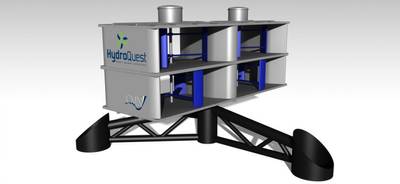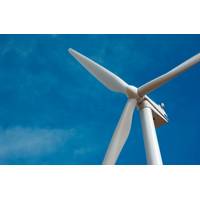An innovative demonstration project for the tidal energy sector has been launched at the International Tidal Energy Summit, being held in London on November 22 and 23.
The project, a collaboration between HydroQuest and CMN (Constructions Mécaniques de Normandie), and implemented with support from the University of Caen Normandie, involves installing an ocean-based 1 MW hydrokinetic tidal turbine at the Paimpol-Bréhat site, as part of an agreement with EDF, from the second half of 2017.
The project was selected in
France’s call-for-projects, “Marine renewable energies and pilot river turbine farms”, funded by the State in the context of its Investments in the Future Program and operated by ADEME.
The demonstrator’s goal is to validate this machine’s performance under real operating conditions, with plans for commercialization on an international scale by 2019.
Pierre Balmer, CEO of CMN, explained, “The partnership surrounding the demonstrator is part of our growth strategy for marine renewable energies, a sector which will become one of the pillars for our company over time, in addition to our historical activity in naval construction. This project, which further solidifies the collaboration we have established with HydroQuest over the past several years, confirms the launch of a French tidal hydrokinetic turbine industry in which we are now present alongside HydroQuest.”
Jean-François Simon, CEO of HydroQuest, said, “Being selected by ADEME demonstrates real recognition by the State of our HydroQuest hydrokinetic turbine technology, which has already proven its effectiveness in river scenarios. Following the validation of our demonstrator’s operation, our goal will be to implement pilot farms with a few turbines in France and around the world. We will then move forward with the installation of commercial farms starting in 2019, thus participating in the
energy transition that is already taking place.”
According to HydroQuest, the ocean turbine offers many benefits, including:
- High performance: with unique technology featuring two vertical axes, free of any prominent central obstacles, the turbine offers efficient hydrodynamic output with nominal power of 1 MW. In addition, this cross-flow turbine is essentially unaffected by current direction, enabling the unit to be fixed to its foundation without any production loss.
- Robust design: the all-metal structure improves resistance to water-related constraints while reducing the cost of maintenance operations.
- Adjustable height: the machine will be developed with one or two levels to adapt to the various depths of worldwide water resources.
- Cost-effectiveness: manufacturing and maintenance costs are reduced, offering one of the best price/MW ratios available for equipment today.
HydroQuest Ocean will be built at CMN workshops in Cherbourg, then ocean-tested under real operating conditions for several months.











